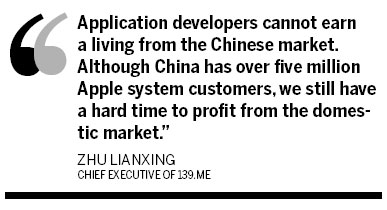iPhone App makers feel squeezed

Beijing - Chinese Apple application developers are finding it tough to turn a profit in the domestic market due to the availability of free hacked applications and Apple's lack of a Chinese-language sales outlet online.
"Application developers cannot earn a living from the Chinese market," said Zhu Lianxing, chief executive of 139.me, which was one of the earliest Apple-application design companies in China, starting in 2008.
"Although China has over five million Apple system customers, we still have a hard time to profit from the domestic market," said Zhu.
Zhu's company has about 20 developers on staff and the company's main revenue stream is from an App game called Colorful Aquarium, which generated over $1,000 for 139.me every day from overseas' App store sales. Revenue from Chinese applications is very limited, contends Zhu.
"The downloads of our Chinese software were never beyond 100 units a day, even though it's free," he said.
After Apple launched its China App Store by the end of 2009, over 27,000 Apple developers had their software on sale, but few profit directly from the online store.
Industry experts in the largest and fastest-growing mobile phone market in the world say competition from unofficial-App stores and the widespread availability of free cracked software are key reasons behind the developers' complaints.
"When customers buy iPhones in the Chinese gray market, vendors offer the customer hacked software that can be piratical installed without paying for it," said Pang Jun, analyst from GFK China. "That made Apple's application store some sort of a failure in China."
Pang said because Chinese users aren't in the habit of paying for applications, the business model of Apple's application store will face an uphill battle and that may impact the long-term development of Apple applications in the world's most populous country, Pang said.
"Programs are easy to hack, so I always turn one application into two versions, a trial one I will offer for free download on a Chinese application website, and the final version, which I put on the US App store," said Travis Wang, an independent Chinese developer.
"It is too easy for Chinese customers to get free applications, so added-value services are the only solution for Chinese developers - if they want to take advantage of the Chinese market," he said.
Language and purchasing barriers to using the App Store are bad news for both Apple Apps' sales and domestic vendors trying to capitalize on the Apple brand hype.
"The localization of China's App store is not run very well," said Wang Bo, CEO of iBokan Wisdom, another Chinese application-design company in the US market. That, Wang said, poses difficulties for Chinese developers to sell in the market.
For example, Chinese customers are required to have an international credit card to log on to the Chinese App store and purchases require payment by either Visa or MasterCard. UnionPay cards, widely used across China, are not accepted.
Japanese Apple users, meanwhile, can use domestic-bank credit cards to pay for the App store applications.
Conforming to market demand, some Chinese App platforms - App store competitors - allow their customers to pay download application fees with their telephone bills.
"Paying with a telephone bill is much more convenient than applying for an international credit card. Besides, a lot of applications in Chinese App store are still in English.
Even the language of the platform is not native Chinese. Customers from the Chinese mainland may have a problem using English version applications," said Tiffany Tian, a 26-year-old iPhone user in China.
According to Apple's financial report from April 21, global iPhone unit sales grew 131 percent this year, and net sales in the Asia-Pacific region recorded the fastest growth with a 184 percent increase.
However, official sales of iPhone in China remain sluggish.
According to figures from China Unicom, the carrier sold some 300,000 iPhones in China in the first two months following the official debut in the country.
Research firm GFK China estimated iPhone sales in China's gray market have reached over 2 million units.
Apple China spokesperson Yang Yan refused to comment for this report.
China Daily
(China Daily 07/09/2010 page16)


















